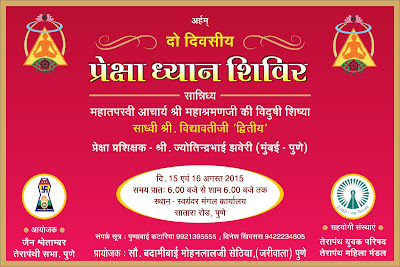Rajasthan high court judgement equating the two must be rectified
 |
| SANTHARA IS NOT SUICIDE |
The Rajasthan high court judgement directing santhara or sallekhana to be treated as suicide under IPC will hopefully, sooner rather than later, be rectified by the apex court.
A charitable description of the judgement would be to call it a digest of arguments and rival contentions, compiled in haste, arranged without finesse, concluded largely without logic and reason, and written perfunctorily and casually.
Forty-one of its 46 pages are a mechanical collection and recitation of rival contentions, with the last four pages perfunctorily reaching the above conclusion, without repelling any of the detailed material and weighty submissions of the Jain community.
Secondly, the Article 25 constitutional guarantee of freedom of conscience and right to freely profess, practise and propagate one's religion is repelled qua santhara by reaching the startling conclusion that there is no evidence or material to show that santhara has been practised by Jains as a religious tenet prior to or after 1950! This will make ancient scholars turn over loudly in their graves and Jain researchers, analysts and authors weep.
References to santhara are many and diverse, physical as also documentary. Many were filed in the high court.
It is explained extensively in Ratnakarandaka Shravakachara of 2nd century AD by Acharya Samantabhadra (Shlokas 122 to 135, also translated by Champat Rai Jain); Chandragupta Maurya, who took and implemented the santhara vow, is archaeologically depicted by ASI Bengaluru Circle 2005; the commemorative Brahmdev pillar at Shravan Belgola of 974 AD with the Kannada inscription depicts the valour and greatness of the Ganga King Marsimha, who, after fulfilling all his promises, relinquished sovereignty, observed the santhara vow for three days and attained Samadhi in the presence of his guru Ajithsena Bhatarakha; diverse memorial stones depict 13th-century Nishadhi Jains in Haveri district of Karnataka doing santhara; Hermann Jacobi's several books, Umaswati's Tatvavarthasutra, Millacra's KundaKunda and so on.
Thirdly, the judgment proceeds to propound that santhara has not been treated as an essential religious practice in any of the scriptures and, further, that what is required to be shown is not only that it is an essential Jain religious practice but that this practice is necessarily required for immortality or moksha or that this “is the only method without which moksha is not attainable“. This is a grievous legal error compounded by the earlier factual ignorance.
There is no mention of the word “essential“ nor of “essential religious practice“ in Article 25. Ambedkar's speech in the Constituent Assembly on December 2, 1948, and the early 1950s Supreme Court judgments make it unambiguously clear that “essential religious practice “ is used in contradistinction to non-religious secular activities. A key shift changes the word “essential“ from qualifying the nature of the practice (religious versus secular) to the later apex court orders using the same word to qualify its importance within the religion (i.e. essential to religion).
The high court proceeds in blissful ignorance of both the factual material referred above as also such legal nuances while arriving at sweeping conclusions, without giving a single reason why the aforesaid diverse ancient material does not qualify this practice as an intrinsic and essential part of Jainism.
Fourthly, the judgment has completely mixed up the philosophical origins of santhara and its fundamental conceptual differences with suicide, sati or euthanasia. Santhara is simply a Jain way of mastering the art of dying as much as the art of living. The animating object of the exercise is neither speedy death nor desire for enhanced lifespan.
Preconditions for santhara are an unavoidable calamity, terminal illness, great natural disaster or imminent death in old age. A Jain may then embark on the ultimate renunciation of his life by preparing for a cheerful, stoic and positive outlook on death after having sought all forgiveness and made every attempt to divorce himself from every possible attachment of life (like affection, attachment, grief or fear), in order to ensure permanent escape from the eternal and unending life cycle of karma.
By purely passive acts of omission, he may let life ebb away with bravery and stoicism. All the negativity, depression, despair, hopelessness, exhaustion, frustration, anxiety or tension associated with suicide is conspicuously missing as also are acts of positive commission involving himsa (violence), which are an essential ingredient of suicide and which, being anathema to Jains, are proscribed.
Similarly, the passionate attachment to a departed relative, the violent acts of commission and the glorification associated with sati are the very antitheses (opposite) of santhara, apart from the significant difference that sati has been banned by parliamentary enactment.
All these fundamental differences are ignored in a simplistic, casual, superficial and perfunctory approach of the high court and no such analysis worth the name finds mention in its operative paragraphs.
It is a patently erroneous judgement waiting to be reversed and rectified.
Adv. Abhishek Singhvi: The writer is a Congress MP and former Additional Solicitor General, India. Views are personal.
Source: TIMES - SANTHARA IS NOT SUICIDE


